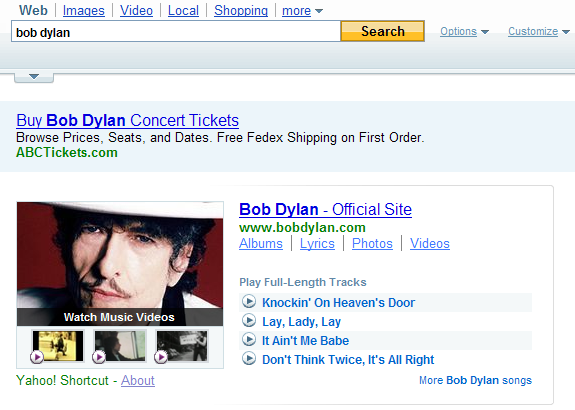Google's Chinese Wall Between AdWords Ads & Organic Search Results Disappears*
In years past Consumer Reports WebWatch studies showed that consumers struggled to differentiate ads from organic search results and that "more than 60 percent of respondents were unaware that search engines accept fees to list some sites more prominently than others in search results."
Since those studies Google has changed the background color on top ads from blue to a light yellow color that is hard to notice on some monitors. Changing my contrast setting from 50% to 55% it is hard for me to see the edge of the sponsored box...it simply bleeds into the organic search results. Google interviewed German searchers to ask if they noticed the yellow background on sponsored links and got a negative answer:
INT [interviewer]: “Why do the results on top have a yellow background, did you notice?”
TP [tester]: “I didn’t notice this.”
INT: “What does it mean?”
TP: “It definitely means they’re the most relevant.”
Google has done studies on the the brand lift of search, but it only tells part of the story. When one considers that
- many searchers do not know where the paid ads are,
- people will be searching more on mobile devices,
- maps and other verticals will eventually have ads integrated in them, and
- search suggestion services may show ads before the searcher hits the search results
...it is going to get much harder to compete for attention in big verticals unless you have the best visitor value and can afford PPC, or you build a formal partnership with the search engines.
To see where this is headed check out the Yahoo! Search results for a popular band, and see how Yahoo! turned their search results into a useful interaction AND an advertisement for Rhapsody - allowing searchers to play songs directly in the search results. Large portions of the search stream (lyrics, music, entertainment, sports) are going to be directly controlled by the search engines that keep users on their network longer and the second click.
* at least in the mind of searchers tested by Google and used in Google promotions to promote paid search advertising.





Comments
One reason (excuse?) is that these guys (search engines) are out there to do business. And everything is fair in love, war and business.
After reading the post I searched three major search engines for a popular keyword and saw that they do mention ads as sponsored ones and differentiate the sponsored ads from organic ones. Probably the poor guy interviewed had no idea about sponsored ads. :)
Aaron, 5-6 years ago, when I was a novice, even I had no idea what these ads were about. I am sure most of us when searching are not bothered whether the results are sponsored or not, what we probably click is something that is of any interest to us.
Defect
the brand lift of search
target: http://www.slideshare.net/studentlamarketing/enquiro-white-paper-the-bra...
?
Yeah, I know: wisenheimer...
I think Bob Dylan is trying to make himself look sexy - why is that? A sexy Bob Dylan pursing his lips, yuk!
@dillipshaw Research generally advocates that people do prefer, or at least trust the organic results, so for this divide to be less apparent jumps on the back of this trend and highlights profit chasing I guess.
"One reason (excuse?) is that these guys (search engines) are out there to do business. And everything is fair in love, war and business."
...Fair point, but maybe almost everything would be fairer...?!
Just wondering Aaron...what screen capture do you use. It's sharp - thanks!
I use SnagIt. And the broken link is now fixed. :)
As time has passed search engines have only grown more aggressive with blending ads as content. Look at the (lack of) color contrast on these examples.
Add new comment